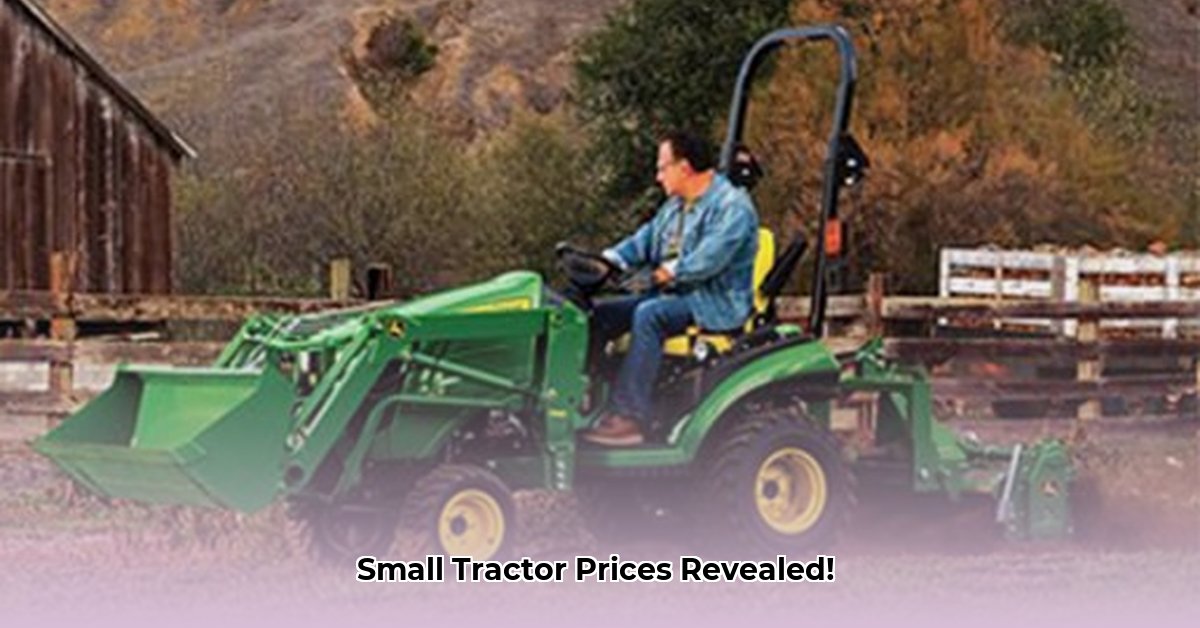
Finding the right small tractor can feel overwhelming, given the wide range of prices and options available. This comprehensive guide will help you navigate the market, understand the cost factors, and make an informed decision. We'll cover everything from horsepower and brand to maintenance and financing, ensuring you're well-equipped to find the perfect tractor for your needs. For more information on tractor tires, check out this helpful resource: tractor tire guide.
Factors Affecting Tractor Price
Several key factors significantly impact the cost of a small tractor. Understanding these will be crucial in setting a realistic budget.
Horsepower (HP): The Engine's Might
Horsepower directly correlates with price. More horsepower means greater power and capability, but it comes at a premium. Compact tractors (typically under 20 HP) usually start around $9,000 – $12,000 new. Mid-size tractors (20-40 HP) significantly increase the price, ranging from $25,000 to $50,000. Larger models quickly exceed the "small tractor" category and its associated price range.
New vs. Used: A Cost-Benefit Analysis
Buying new offers peace of mind; warranties are included and you'll feel that confidence with a pristine machine. However, expect a higher upfront cost. Used tractors offer potential savings but necessitate careful consideration. A thorough pre-purchase inspection by a qualified mechanic is essential to mitigate the risk of hidden mechanical issues.
Brand Recognition: Impact on Value
While not explicitly naming brands, it's important to acknowledge that established brands often command higher prices due to their reputation for quality and reliability. However, thorough research into a brand's reputation for both reliability and parts availability is just as important as its name recognition. Consider value, not just price.
Attachments: Enhancing Capabilities and Costs
Attachments like loaders, backhoes, and tillers significantly add to the initial cost. Carefully assess which attachments are truly essential to avoid unnecessary expense. Prioritize functionality over features when budgeting.
Types of Small Tractors
"Small tractors," generally defined as those under 30 HP, are versatile machines suitable for various applications. These include landscaping, managing small farms or acreage, and maintaining residential properties. Their maneuverability makes them ideal for smaller spaces.
Buying a Tractor: A Step-by-Step Guide
Purchasing a tractor is a substantial investment. Follow these steps for a seamless process:
Determine Your Needs: Carefully consider the tasks the tractor will perform and the size of the area it will cover. This step helps define necessary horsepower and features.
Set a Realistic Budget: Factor in not just the tractor's price but also attachments, taxes, insurance, and ongoing maintenance. A contingency fund for unexpected repairs is highly recommended.
Find Your Tractor: Explore online marketplaces, reputable dealerships, and auctions. Compare prices and features across different sources.
Secure Financing: Consider loan options, leasing, or potential government subsidies. Compare interest rates and terms from various lenders.
Maintenance and Ongoing Costs
Regular maintenance, including oil changes, filter replacements, and inspections, is vital. Older tractors might have higher maintenance costs and potentially limited parts availability. factor this into your long-term cost projections.
Conclusion: Your Informed Purchase
Buying a small tractor requires careful planning and research. By considering the factors outlined above—horsepower, new vs. used, brand reputation, attachments, budgeting, financing, and maintenance—you can make a confident investment that meets your needs and budget for years to come. Remember, taking your time and comparing options thoroughly will lead to a successful purchase.